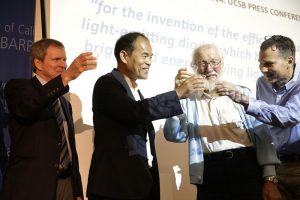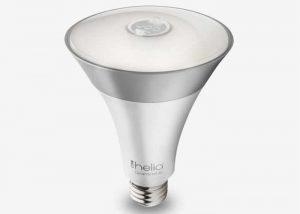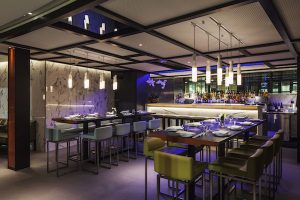January 5, 2017: The company says it’s a healthier, smarter to light a home. About five years ago, startup Soraa emerged onto the scene with an invention from a Japanese LED expert and backing from some of Silicon Valley’s most well-known venture capital firms.
This week, after years of building up a business based on selling LED lights for commercial and industrial buildings, the company launched its very first foray into the consumer market at the CES technology expo in Las Vegas.
Soraa, which was co-founded by Nobel laureate Shuji Nakamura and funded by Khosla Ventures and NEA, calls the lighting product “helia.” It’s a light bulb and smart controller set that dynamically adjusts lighting to help households sleep better, achieve a more convenient lifestyle, and light a house more efficiently.
The light bulbs come in the form of a widely used down light (BR30) and can be screwed into standard sockets at a home or business. To make the lights smart, you need to buy one of the controllers, which pops into the center of one of the lights and contains sensors and a communication chip to enable the lights to connect information over the power line.
Each light will set you back $49.99, plus $29 for the controller, and will be on sale starting in the spring of 2017. The idea is to buy a set of lights, and you’ll just need one controller for the whole group.
So how exactly can lights be “healthier” and help you sleep better? Well, it has to do with blue light and human circadian rhythms. Morning natural light is filled with blue light, and humans are conditioned to wake up under such conditions. Conversely, as the sun sets, blue light disappears and we drift off to sleep.
If you’ve got blue-light-dominant lights on in your house at night, they could be interfering with your rest. Unfortunately, if you’re using LED lights, or have a lot of LED screens on, it’s quite possible you have a lot of blue light getting in the way.
Soraa’s bulbs use LED chips that can replace blue light with violet light, so they can produce a natural-looking light at night without messing with your sleep cycles. The bulbs are also tuned to dynamically change the light spectrum throughout the day to match the natural light as the sun rises and sets.
If this all sounds like the province of hippies, the company says it’s in the early stages of conducting a study with sleep expert and Stanford professor Jamie Zeitzer, the preliminary results of which seem to suggest that Soraa’s lighting interferes less with sleep than do blue-light dominated LEDs. Other companies have launched sleep-friendly LED lights, but many of these have a yellow tinge to them.
In addition to the health aspect, the company has other algorithms that can do things like learn a household’s behavior and adjust the lights accordingly, or maintain the typical lighting schedule automatically when the household’s residents go on vacation. An additional piece of hardware can connect the system to the internet and devices like Amazon’s Alexa. These are a lot of things that smart lighting companies tout, like Philips and its Hue brand.
But the blue-light control is mostly what makes the helia lights unique. The feat is based on Soraa’s original invention, created by Nakamura, which uses the semiconductor gallium nitride for the substrate part of the LED. LEDs commonly place gallium nitride on top of a sapphire or silicon carbide substrate, but Soraa lays gallium nitride on top of gallium nitride.
The result is a more uniform light. Nakamura was awarded the Nobel Prize in physics for knowing such things (specifically for inventing the blue LED). (If you get a chance, read about Nakamura’s back story, lawsuit against his Japanese employer, and move to America, it’s quite fascinating.)
Soraa’s Senior Principal Scientist, Aurelien David, said that the blue-light control, and inducement of healthy sleep, was one of the big reasons why Soraa wanted to make a light for consumers. “It’s an obvious application,” explained David during an interview at CES on the 34th floor of The Venetian.
It’s also because the market opportunity for consumer lights is so large, and because there aren’t a lot of good options for smart lighting out there today, explained Soraa execs Todd Antes and Phil Kearney. However, Antes also acknowledged that the consumer market can sometimes be a tough nut to crack.
The company is also planning to expand its business by launching light fixtures for its commercial customers. So clearly Soraa is looking to grow its revenue and expand beyond its current size.
It’s not clear exactly how big or successful the company has been so far, but Antes said that the company already ships more than 1 million commercial lamps per year, and within a year or two could be generating more than $100 million in annual revenue. Soraa has just under 200 employees, and is in the process of building a new factory in Syracuse, New York to add production capacity beyond that of its current factory in Fremont, California.
A funding filing from 2011 shows that Soraa raised at least $88 million, but it’s unclear if the firm has raised more since then — though it seems likely given the company’s expansion plans. If not, Soraa will likely have to invest in the New York factory in the future.
The early days of the business looked like it was something of a long slog. The company’s current CEO Jeff Parker joined the company about two and a half years ago.
It is undeniably hard to build an independent LED manufacturing company. Switch was another promising LED tech startup that ended up not working out.
We’ll see if Soraa can convince consumers to invest in its healthier, smarter home lighting tech. If all goes well, the company could offer lower-cost options and more basic bulbs like the A19 down the road.
By Katie Fahrenbacher for Greentechmedia.com




